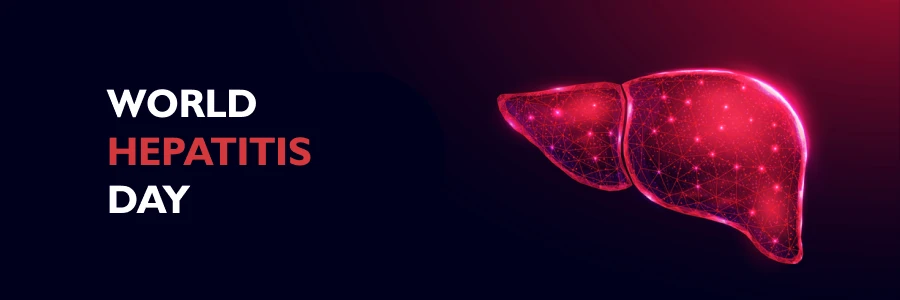
World Hepatitis Day 2022
Most people who have hepatitis infection do not know about it, resulting in serious complications later on. Hepatitis is a silent killer, causing higher morbidity and mortality rates than most other viral diseases. Viral hepatitis is the second most common infectious disease with a high mortality rate after tuberculosis in India.
Let’s spread awareness!
This year, the theme for World Hepatitis Day 2022 is “Bringing hepatitis care closer to you." On this day, we observe Hepatitis Awareness Day to promote health awareness and prevention of the disease.
This day aims to increase worldwide awareness of the importance of hepatitis and to pass the word about its treatment.
Patients experience unnecessary anxiety because of myths surrounding viral hepatitis. Let's first understand about hepatitis disease before clearing up the myths about it!
What is Viral Hepatitis?
Hepatitis is a well-known group of infectious diseases caused by hepatitis viruses A, B, C, D, and E. It refers to a viral infection that causes liver inflammation and damage, (although there are other probable causes as well). Hepatitis can lead to cirrhosis (scarring) of the liver, fibrosis, or liver cancer.
Other possible causes of hepatitis include medicines, drugs, toxins, alcohol, and autoimmune hepatitis (a condition in which the body produces antibodies against its own liver tissue).
What are the five types of viral hepatitis?
Based on the virus responsible for each kind of virally transmitted hepatitis, viral infections of the liver are classified as hepatitis A, B, C, D, and E. While hepatitis A is always a short-term and acute condition, hepatitis B, C, and D can become persistent and chronic. Hepatitis E is usually severe and hazardous, especially in pregnant women.
Secure your health with a second opinion. Make informed decisions and book your appointment today!
Book an AppointmentWhat are the common myths about hepatitis?
Here are a few misconceptions surrounding hepatitis disease that you ought to know to clear up any existing confusion.
1. Myth: All hepatitis infections can be fatal.
Fact: No, hepatitis infection does not kill everyone.
2. Myth: Hepatitis is a genetic and hereditary disease transmitted from parent to child.
Fact: Hepatitis is not an inherited and genetic disease. It usually spreads from mother to child during delivery.
3. Myth: Hepatitis cannot be treated.
Fact: Some cases and forms of hepatitis heal on their own. Many antivirals, as well as combination therapy, are now available to treat hepatitis. Therapies for liver infection are stopping the virus from spreading, and if the recommended course of therapy is followed, the healing rate is very high.
4. Myth: For a person with hepatitis, bland meals and boiled veggies are the best options.
Fact: The most important factor in boosting liver function is nutrition. During the prolonged illness, consuming just boiled and bland food may result in protein-calorie malnutrition.
5. Myth: By touching, coughing, and sharing utensils, hepatitis B can spread.
Fact: No! Only when bodily fluids from an infected person enter another person body through unprotected sex, needle pricking, or transfusions it can cause hepatitis B infection.
6. Myth: Without treatment, hepatitis C goes away.
Fact: About 80% of those who are exposed to hepatitis C could develop a chronic infection. Hepatitis C becomes a long-term or chronic condition for everyone, while a small percentage may be able to overcome the virus without medications. Moreover, hepatitis C can eventually cause cancer, cirrhosis, and liver failure if left untreated.
7. Myth: Jaundice and Hepatitis are synonymous.
Fact: No, the fact for this myth is that jaundice is just a symptom of hepatitis.
There are many ways to prevent hepatitis viral infection. Some preventive measures are hand washing with soap and water, avoiding sharing used needles to inject drugs, hepatitis vaccination, etc. Hepatitis A, B, and C are the three major forms of this liver disease, and their recovery time varies.
Usually, hepatitis A patients will recover within two months and have lifelong immunity. Most individuals infected with hepatitis B will recover in 90 days and have lifelong immunity.
